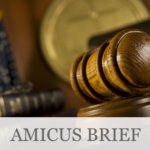‘REMARKABLE BRIEF’ Defending: Due Process. Free Speech. And TIX Regs. From 14 States
 “No one denies the urgent need to prevent sexual harassment and to punish it when it occurs. Sexual harassment of any sort is unacceptable, including harassment at our nation’s public schools and institutions of higher education. No student pursuing an education should do so in fear that she will be victimized and suffer a lifetime of trauma as a result. For decades, however, educational institutions and the Department of Education have betrayed basic constitutional protections in an effort to purge anything offensive from
“No one denies the urgent need to prevent sexual harassment and to punish it when it occurs. Sexual harassment of any sort is unacceptable, including harassment at our nation’s public schools and institutions of higher education. No student pursuing an education should do so in fear that she will be victimized and suffer a lifetime of trauma as a result. For decades, however, educational institutions and the Department of Education have betrayed basic constitutional protections in an effort to purge anything offensive from  campus. These constitutional abuses reached a crescendo when President Obama’s Department of Education issued its misguided 2011 Dear Colleague Letter, which trampled the rights of students and created a false choice: either combat sexual harassment or protect constitutional liberties. We propose a different option: do both.
campus. These constitutional abuses reached a crescendo when President Obama’s Department of Education issued its misguided 2011 Dear Colleague Letter, which trampled the rights of students and created a false choice: either combat sexual harassment or protect constitutional liberties. We propose a different option: do both.
The Department of Education’s new Final Rule accomplishes this goal. It requires educational institutions to investigate and, where proved, punish allegations of sufficiently severe, pervasive, and objectively offensive sexual harassment. It also provides a needed framework, consistent with long-standing Supreme Court precedent, that protects the foundational constitutional rights of due process and speech. Far from enabling those who would exploit the vulnerable, it affirms a culture of accountability within the contours of constitutional liberty. And nothing could better advance the cause of eradicating a culture of sexual harassment than ensuring that those who are punished are truly blameworthy.
 The States of Texas, Alabama, Alaska, Arkansas, Florida, Georgia, Indiana, Kentucky, Louisiana, Mississippi, Oklahoma, South Carolina, South Dakota, and Tennessee, all have robust public education systems that receive federal funding. Each has a compelling interest in the Department issuing clear, practical regulatory guidance, which enables them and the academic institutions within their borders to effectively combat sexual harassment without sacrificing their commitment to either free speech or due process, nor their receipt of federal funds.
The States of Texas, Alabama, Alaska, Arkansas, Florida, Georgia, Indiana, Kentucky, Louisiana, Mississippi, Oklahoma, South Carolina, South Dakota, and Tennessee, all have robust public education systems that receive federal funding. Each has a compelling interest in the Department issuing clear, practical regulatory guidance, which enables them and the academic institutions within their borders to effectively combat sexual harassment without sacrificing their commitment to either free speech or due process, nor their receipt of federal funds.
 The Final Rule helps them attain that balance. The Final Rule builds upon both well-established and emerging law to set forth reasonable standards for combating gender discrimination in educational programs while safeguarding free speech and due process. Moreover, because the Final Rule corresponds to accepted norms, multiple Plaintiffs and the academic institutions they claim to represent
The Final Rule helps them attain that balance. The Final Rule builds upon both well-established and emerging law to set forth reasonable standards for combating gender discrimination in educational programs while safeguarding free speech and due process. Moreover, because the Final Rule corresponds to accepted norms, multiple Plaintiffs and the academic institutions they claim to represent
already have an obligation to provide students with many of the procedures and practices required under the Final Rule. To the extent either claims to be injured, much of that alleged harm originates from Plaintiffs’ own actions and their failure to previously comply with known constitutional standards.” READ: 14 State Amicus Brief

